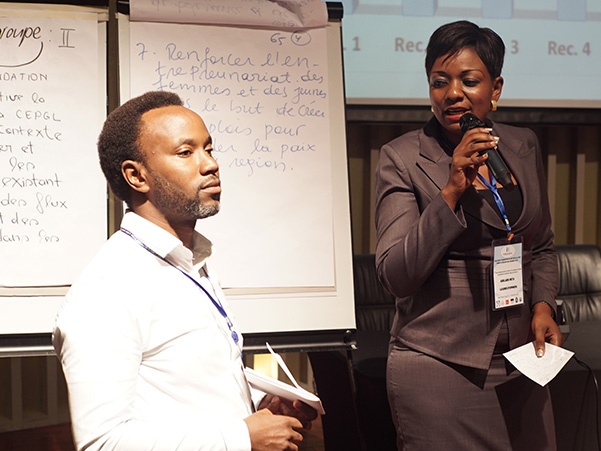My Land, My Life, My Identity: Addressing land conflicts in the Great Lakes Region

The African Great Lakes region has experienced intermittent armed conflict for the past six decades, often resulting in large population displacements and serious humanitarian crises. In the three bordering countries of Rwanda, Burundi and the Democratic Republic of Congo (DRC), the conflicts have decidedly taken a cross-border dimension. A conflict in one of the three countries almost always spills over into the other two.
Although most analysts have largely attributed these conflicts to rivalries over political power, ethnic tensions as well as control of mineral resources, citizens from the three countries have emphasized that land additionally plays a significant role in the region’s conflicts. The citizens were responding to a 2014 research on Land, Identity, Population Movement and Conflicts in the Great Lakes, conducted by Interpeace and its six partner organizations in Great Lakes region. These are the Centre for Conflict Alert and Prevention (CENAP) in Burundi; Never Again Rwanda (NAR) in Rwanda; and four organizations in eastern DRC: Action pour la Paix et la Concorde (APC), Pole Institute, Centre d’Etudes Juridiques Appliquées (CEJA) and Réseau d’Innovation Organisationnelle (RIO).
Researchers from Interpeace and these partner organizations interviewed a total of 1680 people across the region, among them ordinary citizens, top-level national decision makers and representatives of regional organizations. This breadth of respondents allowed the programme team to gain an in-depth understanding of the nexus between land, identity and population movement in the conflicts that frequently afflict the region. The participatory research process also gave the citizens an opportunity to openly discuss obstacles to peace with each other as well as to suggest possible solutions from their perspectives.
Interpeace and its partners presented the findings of the study at a Regional Stakeholders’ forum organized on 2-3 December 2015 in Kinshasa, DRC, under the auspices of the ‘Cross-border dialogue for peace in the Great Lakes region’ programme. The findings elicited rich discussions at the forum, which brought together over 160 participants from across the region, among them representatives of national governments, local communities, regional organizations, and the civil society from Rwanda, Burundi and the DRC, as well as the international community. Beyond validating and obtaining feedback on the study, the forum also sought to provide an open space for dialogue between key actors for peace in the Great Lakes region, at a time when election-related instability and diplomatic tensions threaten regional peace.
The Secretary General of the Economic Community of Central African States (ECCAS), Baudouin Hamuli Kabarhuza, emphasized the need for focussed discussions on the land question in the region, while the DRC’s minister for land affairs, Gustave Boloko Nkeli, described the discussions as ‘timely’. "This forum comes at a time when we are in the midst of implementing programmes to manage land-related conflicts as part of the promotion of peace in the DRC," the minister said.
Participants also identified the priority recommendations proposed by citizens during the participatory action research process. Working together in groups comprising a mix of participants from across the three countries, the participants chose peace education combined with entrepreneurship as one key recommendation in the effort to help alleviate land-related conflict. Participants emphasized that this recommendation should particularly focus on youth and women. They also chose reconciliation in the three countries as the next topic for a participatory action research, to help everyone involved to better understand ways in which peace and education aimed at youth and women can be fostered.
Sweden’s Ambassador to the DRC, Annika Ben-David, urged policy makers to place the research findings into consideration as they represent views from the grassroots. "We hope that this research, which captures the needs and priorities of local populations, will be integrated and used in decision-making processes when designing new policies and programmes for peaceful conflict resolution and social cohesion in the Great Lakes region,” Ambassador Ben-David said in her remarks at the forum.
Towards the close of the forum, the Executive Secretary of the Economic Community of the Great Lakes Countries (CEPGL), Herman Tuyaga, summed up the discussions with a call to action, reminding the participants that everyone has a role to play in the quest for sustainable peace in the region.
Read the report of the meeting here (in French).
More from the regional press
Radio Spot (Burundi, RDC et Rwanda): Forum Régional de Kinshasa
Iwacu (Burundi): Les organisations de la Société Civile du Burundi, de la RDC et du Rwanda engagées ensemble pour la paix
Iwacu (Burundi): Ces terres des autres, qui sont à nous
Journal Indépendant d’Informations Générales (RDC) « La paix par le dialogue et l’éducation» credo commun à 7 organisations dans la région des Grands Lacs
L'Observateur (RDC): Dialogue Transfrontalier dans la région des Grands Lacs, Défis et enjeux : Terre, Identités, Pouvoir et Mouvement des Populations
Radio Okapi (RDC): Kinshasa abritera une conférence sur les conflits dans les Grands lacs
Radio Okapi (RDC): Promouvoir l’entreprenariat des jeunes et des femmes dans les Grands Lacs
The New Times (Rwanda): My Land, My Life, My Identity
